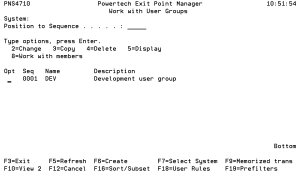How to Get There
On the Groups Menu, choose option 2.
What it Does
The Work with User Groups panel allows you to maintain User Groups.
A User Group is a container for a group of user profile names. A User Group can be used in place of a user profile name in user rules.
The sequence number of a User Group determines the order in which it will be used by the exit point programs.
For example, if there are three User Rules with User Groups for a specific Server/Function, and all three have USER1 as a member, then the User Rule for the User Group with the lowest sequence number will be used by the exit programs (if a User Rule with the specific user name of 'USER1' is not found).
If a group profile is a member of a User Group, the exit programs will not test for the individual profiles that have that profile as a group (or supplemental group) profile.
Field Descriptions
System
System indicates the target of any operations you perform. When you add rules, for example, those rules will be sent to, and will affect processing on, the System named.
Position To
This allows positioning to a starting point for the subfile.
Opt
Enter a valid option from the list of options provided on the list panel.
Seq
Enter the sequence number used that will be used to determine the order in which this User Group will be evaluated by the exit point programs.
For example, if there are three User Rules with User Groups for a specific Server/Function, and all three have USER1 as a member, then the User Rule for the User Group with the lowest sequence number will be used by the exit programs (if a User Rule with the specific user name of 'USER1' is not found).
Name
The User Group name is a short name you assign to a group of user profiles to help you identify the group.
This name is required to be a valid OS name.
Description
The User Group description is a short textual description of the User Group. It is typically used to indicate the purpose or contents of the User Group.
Command Keys
F3 (Exit): Exit the current panel without processing any pending changes.
F5 (Refresh): Refreshes the panel and resets all available text fields.
F6 (Create): Creates a new user group.
F7 (Select system): Use this command to work with data from another System.
F9 (Memorized transactions): Opens the Work with Memorized Transactions panel.
F10 (View2): Displays an alternate view of the panel. See Work with User Group Sequence panel.
F12 (Cancel): Exit the current panel without processing any pending changes.
F16 (Sort/Subset): Displays parameters to subset the list to a more manageable number of items.
F18 (User Rules): Opens the Work with Security by User panel.
F19 (Prefilters): Opens the Work with Location/User Pre-filters panel.
